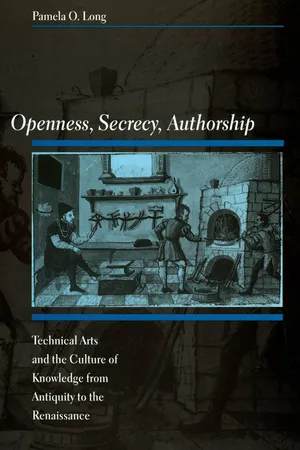
Openness, Secrecy, Authorship
Technical Arts and the Culture of Knowledge from Antiquity to the Renaissance
- English
- ePUB (mobile friendly)
- Available on iOS & Android
Openness, Secrecy, Authorship
Technical Arts and the Culture of Knowledge from Antiquity to the Renaissance
About this book
A history of the book and intellectual property that includes military technology and military secrets.
Winner of The Morris D. Forkosch Prize from the Journal of the History of Ideas
In today's world of intellectual property disputes, industrial espionage, and book signings by famous authors, one easily loses sight of the historical nature of the attribution and ownership of texts. In Openness, Secrecy, Authorship: Technical Arts and the Culture of Knowledge from Antiquity to the Renaissance, Pamela Long combines intellectual history with the history of science and technology to explore the culture of authorship. Using classical Greek as well as medieval and Renaissance European examples, Long traces the definitions, limitations, and traditions of intellectual and scientific creation and attribution. She examines these attitudes as they pertain to the technical and the practical. Although Long's study follows a chronological development, this is not merely a general work. Long is able to examine events and sources within their historical context and locale. By looking at Aristotelian ideas of Praxis, Techne, and Episteme. She explains the tension between craft and ideas, authors and producers. She discusses, with solid research and clear prose, the rise, wane, and resurgence of priority in the crediting and lionizing of authors. Long illuminates the creation and re-creation of ideas like "trade secrets," "plagiarism," "mechanical arts," and "scribal culture." Her historical study complicates prevailing assumptions while inviting a closer look at issues that define so much of our society and thought to this day. She argues that "a useful working definition of authorship permits a gradation of meaning between the poles of authority and originality," and guides us through the term's nuances with clarity rarely matched in a historical study.
Frequently asked questions
- Essential is ideal for learners and professionals who enjoy exploring a wide range of subjects. Access the Essential Library with 800,000+ trusted titles and best-sellers across business, personal growth, and the humanities. Includes unlimited reading time and Standard Read Aloud voice.
- Complete: Perfect for advanced learners and researchers needing full, unrestricted access. Unlock 1.4M+ books across hundreds of subjects, including academic and specialized titles. The Complete Plan also includes advanced features like Premium Read Aloud and Research Assistant.
Please note we cannot support devices running on iOS 13 and Android 7 or earlier. Learn more about using the app.
Information
Table of contents
- Cover
- Halftitle Page
- Title Page
- Copyright Page
- Dedication
- Contents
- List of Illustrations
- Acknowledgments
- Note on Editions and Translations
- Introduction Categories and Key Words: Local Meaning in Long-Term History
- 1 Open Authorship within Ancient Traditions of Technē and Praxis
- 2 Secrecy and Esoteric Knowledge in Late Antiquity
- 3 Handing Down Craft Knowledge
- 4 Authorship on the Mechanical Arts in the Last Scribal Age
- 5 Secrecy and the Esoteric Traditions of the Renaissance
- 6 Openness and Authorship I: Mining, Metallurgy, and the Military Arts
- 7 Openness and Authorship II: Painting, Architecture, and Other Arts
- Epilogue Values of Transmission and the New Sciences
- Notes
- Bibliography
- Index